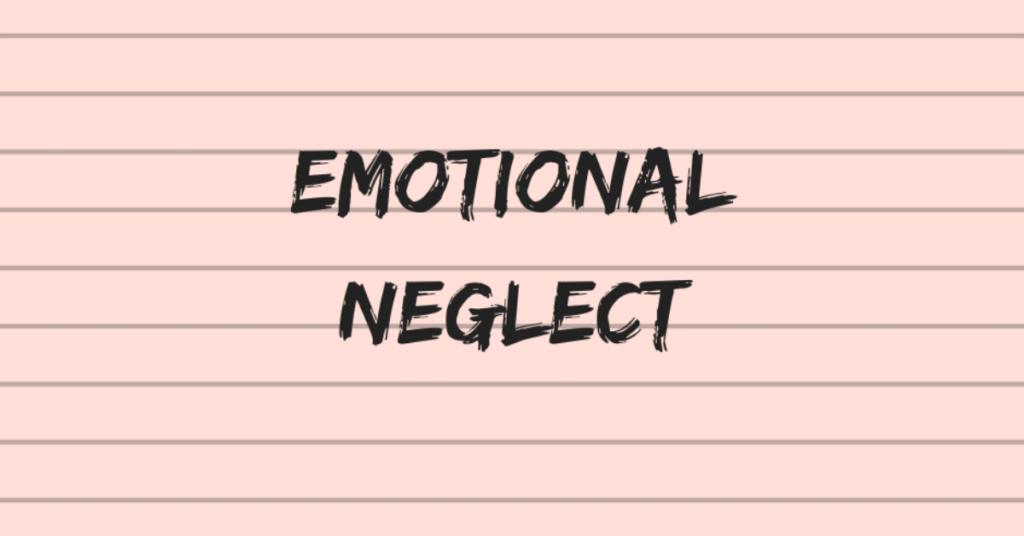Contents
- 1 What Is Emotional Neglect?
- 2 Signs Of Emotional Neglect
- 3 Causes Of Emotional Neglect
- 4 Who May Experience Emotional Neglect?
- 5 Why Overcoming Emotional Neglect Is Important?
- 6 Effects Of Emotional Neglect
- 7 Tips For Parents To Help With Emotional Neglect
- 8 Therapy For Emotional Neglect
- 9 Tips For Overcoming Emotional Neglect
- 10 A Word From MantraCare
What Is Emotional Neglect?

Emotional neglect can be a very damaging experience for a child. It occurs when a child doesn’t receive the emotional support that they need from their parents or primary caregivers. This can lead to a variety of problems down the road, including but not limited to: difficulty forming relationships, low self-esteem, depression, and anxiety.
There are many different types of neglect in our world today. One type is emotional neglect, which can be just as detrimental to a person’s well-being as physical neglect. This means that if you’re feeling sad, angry, or frustrated for no reason at all, it could be because you’re not getting enough attention from your loved ones. Read on to find out more.
Emotional neglect is usually defined by at least one of the following:
- Ignoring a person’s emotions
- Not responding to a person’s emotions
- Invalidating a person’s emotions.
In some cases, people emotionally neglect someone deliberately as a form of punishment.
Signs Of Emotional Neglect
If you’re worried that you or someone you know may be experiencing it, there are some signs to look out for. These include:

- Feeling sad or angry for no reason
- Low self-esteem
- Difficulty forming relationships
- Feeling withdrawn or isolated from others
- Experiencing chronic stress or anxiety
- Have trouble controlling your emotions
Most children who suffer from this type of abuse are often able to function in public settings such as school or work but have trouble with relationships and their own self-image. If you do feel that you are experiencing emotional neglect, there are ways to cope with it. First of all, know that your feelings are valid. Secondly, try reaching out to someone who will support you during this tough time. Lastly, don’t be afraid to ask for help from a professional if need be.
Causes Of Emotional Neglect
Emotional neglect is caused by the environment disregarding the child’s need for attention and affection from their parents. Parents can be emotionally neglectful in a number of ways, such as:
- Not recognizing the child’s emotions and validating them in an appropriate way.
- Not spending enough time with the child or purposely ignoring them when they are upset.
- Disregarding any need for attention or affection from their parents.
- Forcing the child to grow up too fast by having overbearing expectations of them, such as not allowing them to express emotions as a child.
- Not giving the child as much care as they need because there are other children in the family who need more attention.
- A lack of positive reinforcement for appropriate behavior from the child.
- Putting too many unrealistic demands on the child’s behavior – perfectionism is a big one.
- Not being able to meet the child’s expectations for their own self-image or self-worth, such as telling them they can’t do something because of their gender.
Emotional neglect is not always intentional from parents and adults may not even realize they are doing it until a child points it out to them. A child may experience emotional neglect even when parents say they love them. This is because the type of love they feel from their parents isn’t enough to sustain them and make them feel like they matter.
Who May Experience Emotional Neglect?

Most children who suffer from emotional neglect are those that come from high conflict homes. These children have a tendency to do poorly in school and have a lack of self-image. They also have a hard time staying on task for any length of time.
It is extremely difficult for a child to grow up with an emotionally neglectful parent because they need so much care and attention to thrive. This type of neglect is hard to identify but has been said the have the most detrimental consequences.
An adult who was emotionally neglected as a child can also be at risk of developing depression, anxiety, and other mental health disorders.
There are three main reasons why people experience emotional neglect:
1. They experience an environment where their emotions are not taken into consideration and were never validated.
2. The child has overly high or unrealistic expectations for the kind of attention they need from people, such as parents, teachers, etc. As a result of this feeling, they don’t receive what is necessary to thrive.
3. The child has a personality type that makes them look for certain emotions from people, such as love or attention, and their environment doesn’t provide the right kind. They may be predisposed to low self-esteem or depression.
Why Overcoming Emotional Neglect Is Important?
People who are being emotionally neglected are at a much higher risk for mental health problems, especially depression. If left untreated, this could develop into something much worse. This is why getting help is so important. There are many resources available to people who need them, including professional counseling services and support groups.
Emotional neglect can be just as damaging to a child as physical abuse. Even though it doesn’t leave any visible scars, the invisible ones can last a lifetime if left untreated. If you feel that you or someone you know is experiencing emotional neglect, there are ways to cope with it and get help – don’t keep this damaging experience a secret.
Effects Of Emotional Neglect
When an individual is not provided with the necessary emotional attention, it is difficult to grow and maintain healthy relationships. The effects of emotional neglect are that the person will have-

- Difficulties with interpersonal functioning
- Display maladaptive behaviors
- Unstable or inconsistent emotions
- Poor impulse control
- Difficulty regulating emotions
Loneliness
Empathic relationships are based on mutual understanding and neediness. Empathic relationships can play a large role in meeting someone’s needs for stability and belonging within their community. When an individual suffers from being emotionally neglected they have difficulty forming these connections due to their unstable or inconsistent emotions. They may also feel disconnected from others because of their inability to regulate their emotions. These individuals are more likely to report feeling lonely and detached from themselves and others.
Borderline Personality Disorder
There is some evidence that emotional neglect may lead to borderline personality disorder (BPD) in adulthood. BPD is a serious mental illness that is characterized by unstable emotions, intense relationships, and impulsive behavior. People with BPD often feel like they are not good enough or are unworthy of love and care. They often have difficulties with interpersonal relationships and can be highly sensitive to stresses in their environment.
Emotional neglect is not easy to identify but it can have serious effects if it continues over time. It is important that you are aware of the signs that someone you know may be experiencing emotional neglect so that they can get the help they need.
If you feel you or someone you care about is experiencing it, try reaching out to a professional counselor or support group. You can also visit our website for more information about emotional neglect and its effects on children and adults.
Tips For Parents To Help With Emotional Neglect
 If you have a loved one who you believe is experiencing emotional neglect, there are things you can do to help. First, try reaching out to them and offer your support. Secondly, make sure that they know they can come to you with anything that’s bothering them. Lastly, don’t be afraid to ask them if they have noticed any signs of emotional neglect.
If you have a loved one who you believe is experiencing emotional neglect, there are things you can do to help. First, try reaching out to them and offer your support. Secondly, make sure that they know they can come to you with anything that’s bothering them. Lastly, don’t be afraid to ask them if they have noticed any signs of emotional neglect.
Parents and loved ones play an important role in helping someone who is experiencing emotional neglect. They can offer support, understanding, and resources to get the help that person needs. If you are a parent or loved one of someone who you believe is experiencing emotional neglect, here are some things you can do to help:
- Reach out to them and offer your support
- Make sure they know that they can come to you with anything that is bothering them
- Don’t be afraid to ask them if they have noticed any signs of emotional neglect
If you are experiencing emotional neglect and would like some help, there are a few resources available. First, try reaching out to a professional counselor or support group who can offer you the support you need.
-Reach out to a professional counselor, they can help you deal with the emotions that you are experiencing
There are many support groups available for people who are struggling with emotional neglect. These groups can offer you a safe space to share your experiences and receive support from others who understand what you’re going through
Therapy For Emotional Neglect
There are many different types of therapy available for people who are recovering from emotional neglect. Some of the most common therapies include Cognitive Behavioral Therapy (CBT), Dialectical Behavior Therapy (DBT), and Eye Movement Desensitization and Reprocessing (EMDR).
Cognitive Behavioral Therapy is a type of therapy that helps people to identify and change the thoughts and beliefs that are causing them distress. CBT can be helpful for people who have difficulty regulating their emotions.
Dialectical Behavior Therapy is a type of therapy that helps people to manage their emotions and relationships. DBT can be helpful for people who have difficulty managing their emotions or relationships, or who engage in self-destructive behaviors.
Eye Movement Desensitization and Reprocessing is a technique that uses eye movements or sounds to help people reprocess their emotions. EMDR can be helpful for people who have difficulty coping with negative memories or distressing thoughts.
Tips For Overcoming Emotional Neglect
 If you’re struggling with emotional neglect, it’s important to-
If you’re struggling with emotional neglect, it’s important to-
- Be mindful of your thoughts and emotions
- Avoid blaming others for things outside of their control
- Accept that other people might not always be able to understand how you feel, but that doesn’t mean that they don’t care or love you just because they can’t fully relate
- If you want to open up about your feelings, do so in person or through a medium like an email, where it’s easier for people to reply
- If you’re feeling lost or struggling to cope with emotional neglect, then it might be helpful to seek out a therapist or counselor
- They can help you process your thoughts and feelings in a safe and supportive environment.
- Talking about emotional neglect can also help reduce the sense of isolation that often comes with it.
It can be hard to talk about emotional neglect, either because of the stigma attached or simply due to a lack of resources. Therefore if you’re feeling lost and struggling with your emotions on your own, then reach out for help. A therapist might be able to give you some one-on-one time that will allow you to process thoughts and feelings in an environment where it’s safe to do so without judgment.
A Word From MantraCare
Your mental health — your psychological, emotional, and social well-being — has an impact on every aspect of your life. Positive mental health essentially allows you to effectively deal with life’s everyday challenges.
For more information and Guidance, please contact MantraCare. If you have any queries regarding Online Child Counseling or Teen Counseling experienced therapists at MantraCare can help: Book a trial therapy session


